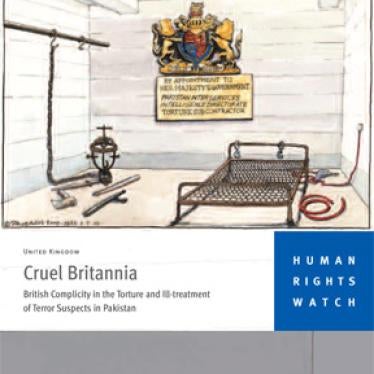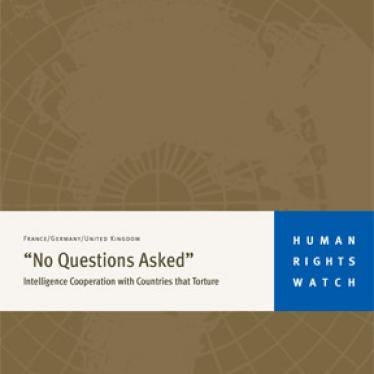Sir Peter Gibson
Ripley Building
26 Whitehall
London
SW1 2WH
2 December 2010
Dear Sir Peter,
I am writing to you in your capacity as chairman of the Inquiry into UK involvement with detainees in overseas counter-terrorism operations.
With the recent out of court settlement in the civil litigation brought against the government by former detainees, and the decision by the Director of Public Prosecutions not to proceed with the case against the MI5 officer, it is now possible to envision the commencement of the inquiry in the near future, once the other pending criminal cases are resolved. In that context, we feel it is now appropriate to offer our thoughts on the Inquiry.
As you may know Human Rights Watch long argued for an independent, judge-led inquiry into apparent British complicity in torture and other unlawful ill-treatment, and we welcomed the decision by the Prime Minister to announce such an Inquiry.
Our conclusion that an Inquiry is necessary flows directly from our research, notably the enclosed Cruel Britannia: British Complicity in the Torture and Ill-treatment of Terror Suspects in Pakistan and No Questions Asked: Intelligence Cooperation with Countries that Torture. Both are enclosed.
In his letter to you dated 6th July 2010, the Prime Minister wrote that "The particular focus [of the Inquiry] is the immediate aftermath of the attacks of 11 September 2001 and particularly cases involving the detention of UK nationals and residents in Guantanamo Bay."
We would urge you to broaden the scope of the Inquiry, especially in light of the above reports, which demonstrate that abuses are not confined solely to the US. The accounts of the victims in Cruel Britannia, corroborated by security intelligence officials, indicate British complicity in individual cases of torture by the authorities in Pakistan. Similarly, No Questions Asked documents reliance by UK authorities on intelligence obtained under torture in third countries around the world.
The Prime Minister's letter indicates that the Inquiry may "invite evidence from those who allege mistreatment and other interested parties." The above reports, combined with the evidence we gave to the UK Parliamentary Joint Committee on Human Rights and Foreign Affairs Committee in 2009, and our general expertise in relation to accountability for torture around the world, place Human Rights Watch in these categories and we are willing to co-operate with the Inquiry.
With this in mind we suggest the following key foci for your inquiry:
Legal framework
It is critical that there is a clear legal understanding of ‘complicity in torture' and what acts can and should constitute that crime. The UK's obligations under international law, in particular the Convention Against Torture and Other Cruel, Inhuman or Degrading Treatment or Punishment (CAT) should be fully considered. The inquiry should consider whether UK law meets its obligation under CAT to criminalise all acts of torture, of attempted torture and of participation or complicity in torture, including of those in positions of authority, without allowing for any justification for torture whatsoever. The inquiry should go on to consider whether the UK accepts the application of the international and domestic law on torture to acts of agents outside the United Kingdom and whether such law is fully understood by all its agents.
With this in mind we suggest the Inquiry appoint as Counsel a senior lawyer with expertise in the international law on torture. We would be happy to present further detailed evidence on the legal issues.
Policy, orders and legal advice
We suggest that the inquiry focuses on policy, orders, and any legal advice given since 2001. While consideration of individual cases is necessary, and we would be happy to assist the inquiry with our knowledge of some of these cases, the overarching objective should be to determine whether these cases formed part of a wider pattern of complicity of torture, rather than being the work of ‘rogue agents' and the extent to which it flowed from the policy, orders and legal advice.
It will be important to publish and discuss all such policy (including guidance), orders and legal advice given to agents in areas that could amount to complicity in torture. In particular ministerial accountability should be made clear. If complicity has occurred it will be necessary to examine why this happened-was it the result of a deliberate decision on the ground to ignore international law, was it the result of policy, orders or legal advice that misstated legal obligations or failed to provide clarity about what the law required, or was it due to lack of knowledge at operational or policy level as to what conduct amounts to complicity?
This will require examination of the guidance on overseas interrogations and other forms of cooperation with foreign governments in force at the relevant time, advising members of the security services on the treatment of detainees. Moreover, if this assessment is to be used in order to fulfil the Inquiry's objective of establishing ‘lessons learned' and making ‘recommendations for the future,' it is essential that the current guidance on overseas interrogation is also examined to ensure that it avoids any of the shortfalls exposed in the previous advice.
We also suggest that the inquiry looks specifically at the United Kingdom's use of intelligence that may have been obtained by torture or other ill-treatment and whether the policy, guidance and protocols around the use of such material are sufficient to ensure that the UK's use of foreign intelligence does not make it complicit in such abuse.
Judicial mechanisms of accountability
Effective investigations and prosecutions of all acts of torture are a key obligation for all parties to the UN Convention Against Torture. We understand that the inquiry will not want to duplicate any criminal investigation and we would support that. Indeed we would strongly urge the inquiry not to jeopardize future criminal prosecutions (e.g. by granting any general immunization from prosecution) and that it avoid drawing any conclusions about criminal acts that may have been committed by individuals.
However it is critically important for the Inquiry to consider whether in the United Kingdom, there are adequate civil and military mechanisms of accountability to ensure that acts of torture, including complicity, by state agents can be effectively prosecuted, including where the acts take places outside the United Kingdom. This will require an examination of the following questions:
- Is the law adequate to criminalize all such acts, wherever in the world they take place, including holding those who give such orders accountable?
- Are there systems in place to ensure all suspected criminal acts are reported to an independent criminal investigator (i.e. a part of the police)?
- Are the police able to fully investigate (including having the specific skills and knowledge, power to interview and obtain other evidence from the services and with the sufficient backing from senior offices to prioritise such investigations?)
- Is the CPS able to make decisions to prosecute, recognizing the public interest in holding persons accountable for what is considered one of the most serious crimes in international law?
- Are the police and CPS able to investigate and make their decisions without governmental interference; whether from the Attorney General or other ministers, given that ministerial responsibility may be an issue?
Other forms of accountability
We would also suggest you look at other bodies that should have been able to investigate and hold ministers and senior officers accountable for such acts, in particular the Intelligence and Security Committee, and whether those bodies offered adequate oversight.
The importance of the Inquiry extends beyond the borders of the United Kingdom. The United Kingdom is a strong supporter of accountability for torture, war crimes and crimes against humanity around the world. To avoid accusations of double standards, it is essential that the UK demonstrates its willingness to abide by its obligations under the UN Convention against Torture with regards to alleged crimes committed by its own nationals. The Inquiry will play an essential role in that process.
Human Rights Watch stands ready to assist the Inquiry in its critically important task. Please do not hesitate to contact us should you require further information or wish to discuss any of the above matters.
Yours sincerely,
Tom Porteous
UK Director
cc:
The Rt. Hon. David Cameron MP, Prime Minister
The Rt. Hon. Nick Clegg MP, Deputy Prime Minister
The Rt Hon Baroness Neville-Jones, DCMG
The Rt Hon Dame Janet Paraskeva, DBE
The Rt Hon Peter Riddell
Sir Gus O'Donnell, KCB
Sir Peter Ricketts, KCMG








